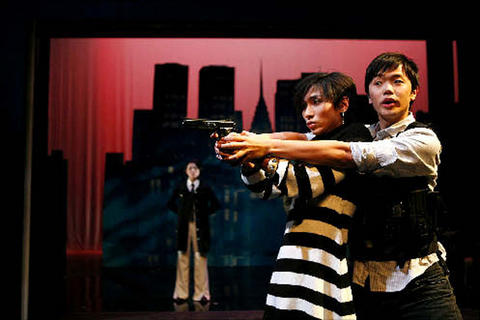Tainaner Ensemble's (台南人劇團) latest production, K24 Chaos is a six-hour play within a play that incorporates Shakespeare's Romeo and Juliet and employs a plotline similar to the television series Alias. It may seem strange to combine a love story using elements from a spy serial, but Tsai Po-chang's (蔡柏璋) script makes an admirable attempt.
At least for the first two acts, or episodes, as Tsai calls them, he pulls it off. Both staging and acting are tight and the story intricate and intriguing.
These acts were originally written two years ago for a festival on Matsu Island and the comedy really only needed one more episode to bring it to a conclusion.

PHOTO COURTESY OF TAINANER ENSEMBLE
In the play, rehearsals for the staging of Shakespeare's famous tragedy are interrupted by the mysterious disappearance of an actress and the uncovering of a plot to assassinate the president's daughter, who plays the leading role of Juliet.
The first two episodes work because the disappearance in the first leads to the casting of a male undercover agent who has to learn to play the role of a woman - helped along with great humor by a transvestite - in the second.
Throughout the plot, allusions to Taiwan's celebrity-obsessed culture and the media environment that props it up, along with plot twists and a suspenseful score kept the story moving at a fast past and the audience laughing out loud.

PHOTO COURTESY OF TAINANER ENSEMBLE
The rotating circular stage was used to brilliant effect because the audience was privy to the backstage machinations of the plotters and petty infighting of the actors.
But the intriguing beginning largely falls apart in the third episode because the script tries to incorporate too many diverse plots into the story. Though the jokes and plot twists remain, Tsai's script would have been better served if he had solved the mystery three hours earlier.

April 28 to May 4 During the Japanese colonial era, a city’s “first” high school typically served Japanese students, while Taiwanese attended the “second” high school. Only in Taichung was this reversed. That’s because when Taichung First High School opened its doors on May 1, 1915 to serve Taiwanese students who were previously barred from secondary education, it was the only high school in town. Former principal Hideo Azukisawa threatened to quit when the government in 1922 attempted to transfer the “first” designation to a new local high school for Japanese students, leading to this unusual situation. Prior to the Taichung First

The Ministry of Education last month proposed a nationwide ban on mobile devices in schools, aiming to curb concerns over student phone addiction. Under the revised regulation, which will take effect in August, teachers and schools will be required to collect mobile devices — including phones, laptops and wearables devices — for safekeeping during school hours, unless they are being used for educational purposes. For Chang Fong-ching (張鳳琴), the ban will have a positive impact. “It’s a good move,” says the professor in the department of

On April 17, Chinese Nationalist Party (KMT) Chairman Eric Chu (朱立倫) launched a bold campaign to revive and revitalize the KMT base by calling for an impromptu rally at the Taipei prosecutor’s offices to protest recent arrests of KMT recall campaigners over allegations of forgery and fraud involving signatures of dead voters. The protest had no time to apply for permits and was illegal, but that played into the sense of opposition grievance at alleged weaponization of the judiciary by the Democratic Progressive Party (DPP) to “annihilate” the opposition parties. Blamed for faltering recall campaigns and faced with a KMT chair

Article 2 of the Additional Articles of the Constitution of the Republic of China (中華民國憲法增修條文) stipulates that upon a vote of no confidence in the premier, the president can dissolve the legislature within 10 days. If the legislature is dissolved, a new legislative election must be held within 60 days, and the legislators’ terms will then be reckoned from that election. Two weeks ago Taipei Mayor Chiang Wan-an (蔣萬安) of the Chinese Nationalist Party (KMT) proposed that the legislature hold a vote of no confidence in the premier and dare the president to dissolve the legislature. The legislature is currently controlled